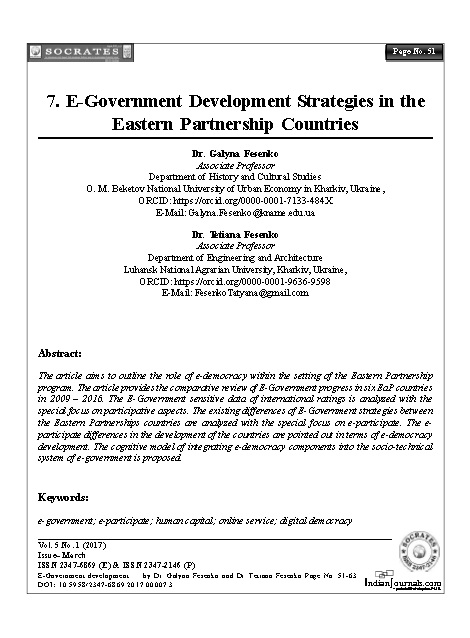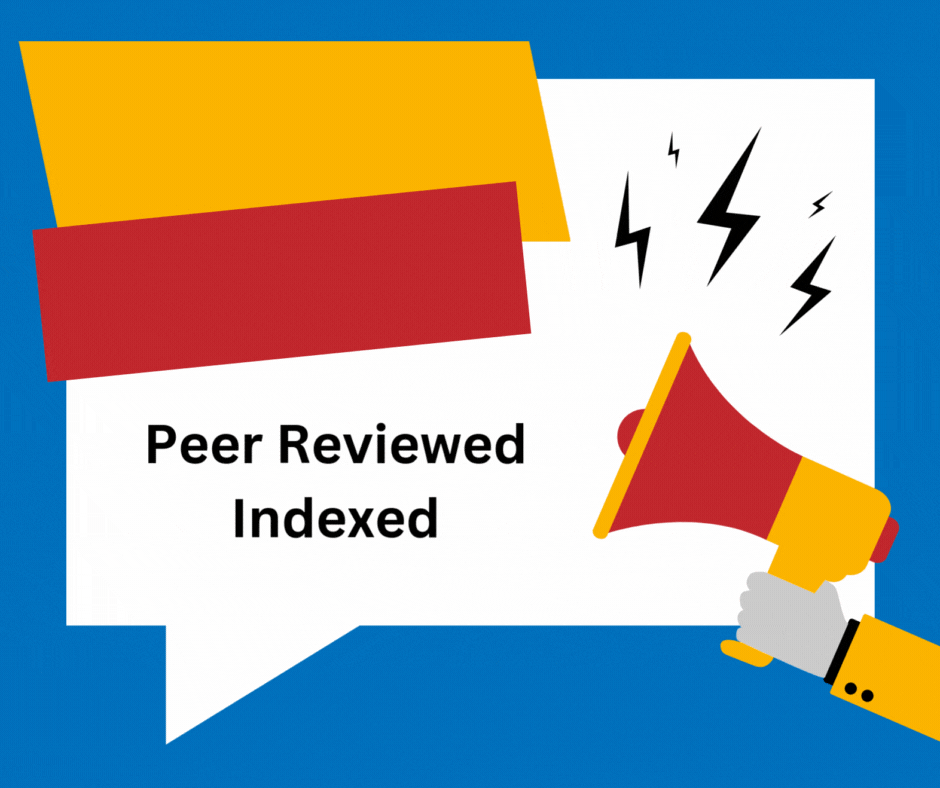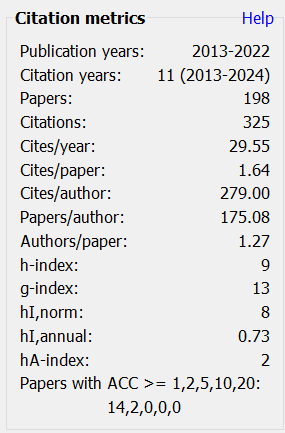E-Government development strategies in the Eastern Partnership countries
DOI:
https://doi.org/10.5958/2347-6869.2017.00007.3Keywords:
e-government, e-participate, human capital, online service, digital democracyAbstract
The article aims to outline the role of e-democracy within the setting of the Eastern Partnership program. The article provides the comparative review of E-Government progress in six EaP countries in 2009 – 2016. The E-Government sensitive data of international ratings is analyzed with the special focus on participative aspects. The existing differences of E-Government strategies between the Eastern Partnerships countries are analyzed with the special focus on e-participate. The e-participate differences in the development of the countries are pointed out in terms of e-democracy development. The cognitive model of integrating e-democracy components into the socio-technical system of e-government is proposed.
Article DOI : 10.5958/2347-6869.2017.00007.3
Downloads
Metrics
References
Fesenko, T. and Fesenko, G. (2016). E-Readiness evaluation modelling for the monitoring programs E-Government at the national level (for the example of Ukraine). Easten-European Journal of Interiorise Technologies. 3(81) : 28 - 35. doi: 10.15587/1729-4061.2016.71606.
Fesenko, T., Shahov, A., Fesenko, G. (2017). ??????????????????? ?Gender Indexes as the Instrument of New Silk Road Development?. ??????????“????”???????????????? ?Silk Road Develop and Governance Innovation: Social Development International Symposium in “The belt and road” along countries?. Beijing: Social Sciences Academic Press (China) : 100 - 105. Retrieved from http://eprints.kname.edu.ua/45534/.
Hawkes, J. (2001). The Fourth Pillar of Sustainability. Culture`s essential role in public planning. Melbourne: Common Ground Publishing Pty Ltd.
?apczy?ski, M. (2009). The European Union’s eastern partnership: chances and perspectives. Caucasian review of international affairs. 3(2) : 43 - 155.
Dr. Maarten, H. (2016). A modern Socrates discourse in a local e-government setting. SOCRATES. 4(3) : 1 - 12.
Prof. Ohara, S. (2005), P2M. A guidebook of project and program management for enterprise innovation. Project Management Association of Japan (PMAJ). Retrieved from https://articulospm.files.wordpress.com/2013/01/p2mguidebookvolume1_060112.pdf.
Sian, L. and Yih, C. (2012). A review towards the new Japanese project management: P2M and KPM. Trends and Development in Management Studies. 1(1) : 25 - 41.
Tallo, I, Hänni, L., Ott, A., Rikk R. and Peda M. (2013). Eastern Partnership Review Comparative Study of Open Governance and Data Security in Eastern Partnership Countries. Tallinn: Estonian Center of Eastern Partnership (ECEAP).
Talmachiu, M. (2015). The influence of cultural variables on sustainable development. An analysis in the European context. Regional development and integration. New challenges for the EU. EURINT conference proceedings, May 22-23, 2015. Ia?i: Editura Universit??ii „Alexandru Ioan Cuza” : 328 - 341.
United Nations E-Government Survey 2014: E-Government for the future we want. New York: Department of Economic and Social Affairs. Retrieved from https://publicadministration.un.org/egovkb/portals/egovkb/documents/un/2014-survey/e-gov_complete_survey-2014.pdf.
United Nations E-Government Survey 2016: E-Government in Support of Sustainable Development. New York: Department of Economic and Social Affairs. Retrieved from http://workspace.unpan.org/sites/Internet/Documents/UNPAN96407.pdf.

Downloads
Published
How to Cite
Issue
Section
License
Copyright (c) 2017 Fesenko Galyna, Dr., Fesenko Tetiana, Dr.

This work is licensed under a Creative Commons Attribution-NonCommercial 4.0 International License.
Revised Copyright/CC license that applies to all the articles published after 05-02-2017
Attribution-NonCommercial 4.0 International (CC BY-NC 4.0)

Copyright/CC license that applies to all the articles published before 05-02-2017
Attribution-Non Commercial-No Derivatives 4.0 International (CC BY-NC-ND 4.0)

Author(s) will retain all the right except commercial and re-publishing rights. In the case of re-publishing, they will have to obtain written permission from the journal. Additional licensing agreements (Creative Commons licenses) grants rights to readers to copy, distribute, display and perform the work as long as you give the original author(s) credit, they can not use the works for commercial purposes and are not allowed to alter, transform, or build upon the work. For any reuse or distribution, readers and users must make clear to others the license terms of this work. Any of these conditions can be waived if you get permission from the copyright holders. Nothing in this license impairs or restricts the authors’ rights. To view a copy of this license, visit http://creativecommons.org/licenses/by-nc-nd/4.0/ or send a letter to Creative Commons, 171 Second Street, Suite 300, San Francisco, California, 94105, USA.
Research Papers published in SOCRATES are licensed under an Attribution-NonCommercial-NoDerivatives 4.0 International (CC BY-NC-ND 4.0)
















